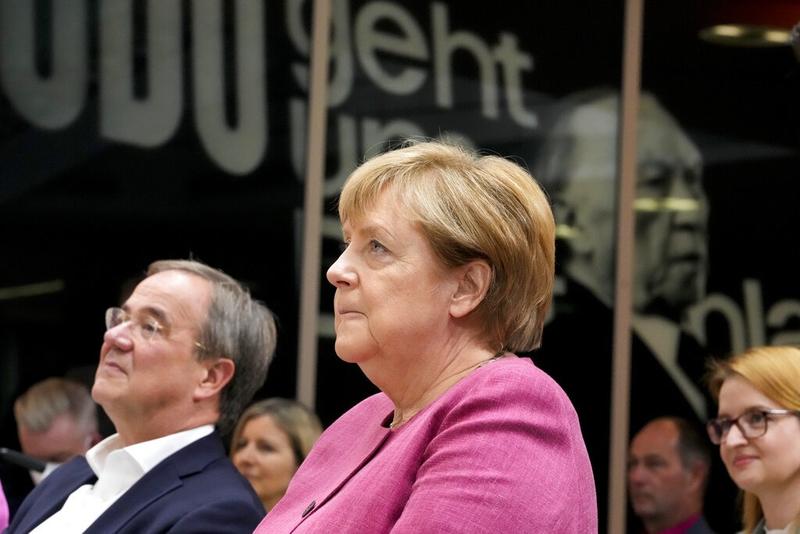 German Chancellor Angela Merkel (center) and the governor of German state North Rhine-Westphalia and Christian Union parties candidate for chancellor Armin Laschet attend an event of his Christian parties to present a program of the future digital policy for the country at the party's headquarters in Berlin, Germany, on Sept 6, 2021. (MARKUS SCHREIBER / POOL / AP)
German Chancellor Angela Merkel (center) and the governor of German state North Rhine-Westphalia and Christian Union parties candidate for chancellor Armin Laschet attend an event of his Christian parties to present a program of the future digital policy for the country at the party's headquarters in Berlin, Germany, on Sept 6, 2021. (MARKUS SCHREIBER / POOL / AP)
For weeks Angela Merkel has been observing from afar the leader of her once-mighty party, the Christian Democrats, fall apart. The German chancellor finally decided to step in to try and salvage a floundering campaign, but it may be too late.
At stake is not just her legacy, as a veteran who’s governed Germany with a solid mandate for 16 years. As things stand, the motor of the European economy, could move from conservative hands to a Socialist government with potential policy implications for business and markets.
“It matters who runs the country,” the four-term chancellor told lawmakers on Tuesday, evoking a familiar line of attack from the party’s arsenal.
As Chancellor Angela Merkel addressed parliament, the CDU/CSU bloc led by Armin Laschet was digesting another bombshell. A new survey showed support for Merkel’s alliance dropped below 20 percent for the first time since polls were taken after World War II. Meanwhile, Olaf Scholz keeps gaining momentum
But the red-specter scenario isn’t scaring Germans and implying that the Social Democrats will cast their lot with the anti-capitalist Left, a party that traces part of its roots to the East German communist party, might not be as effective as it might once have been.
The reason is that it’s her own finance minister, Olaf Scholz, who is the public’s favorite candidate. He hails from the SPD and is part of the ruling “grand coalition.” In the mind of voters his temperament is similar to hers and his economic policies during the pandemic were made under her government.
As Merkel addressed parliament, the CDU/CSU bloc led by Armin Laschet was digesting another bombshell. A new survey showed support for Merkel’s alliance dropped below 20 percent for the first time since polls were taken after World War II. Meanwhile, Scholz keeps gaining momentum.
“It’s certainly a very serious situation,” Markus Soeder, leader of the CDU’s CSU sister party in Bavaria and premier of the southern state, said Wednesday in an interview with Deutschlandfunk radio.
ALSO READ: Merkel endorses Laschet, takes swipe at Scholz in election pitch
Soeder had been pushing for some time for Merkel to intensify her campaigning, he said, adding that he had been “beating the drum” for the CDU/CSU for weeks. “If everyone did the same maybe we’d be in a better situation,” he said.
If the CDU get locked out of power, the question that will dog Angela Merkel is whether an earlier intervention on her part would have made a difference and salvaged a lackluster candidate who struggled from the get-go
With her party staring into the abyss, Merkel faces a bitter end to an illustrious domestic career. If the CDU get locked out of power, the question that will dog her is whether an earlier intervention on her part would have made a difference and salvaged a lackluster candidate who struggled from the get-go.
Merkel has stayed out of the political fray since handing over the leadership of the CDU - and kept her distance from Laschet’s campaign, even as it spiraled when the party leader was caught on camera chuckling with officials during a tour of flood-ravaged areas of his state in July.
It’s not clear how much of Merkel’s still-formidable popularity could have rubbed off on Laschet, the affable premier of Germany’s most populous state, North Rhine-Westphalia. But he got little help as he slipped well below that of Scholz, Merkel’s vice chancellor since 2018.
Merkel’s position is unique. She was the country’s first woman chancellor and rose through the ranks of a party dominated by men through outmaneuvering - or in some cases waiting out - rivals who underestimated her. Before Laschet became the party’s leader and candidate for chancellor there was Annegret Kramp-Karrenbauer.
The current defense minister took over the party in 2018 as a chairwoman with a view to preserving the Merkel brand. The German media dubbed AKK the mini-Merkel, yet Kramp-Karrenbauer’s authority evaporated quickly and Merkel made a point of not propping up her heir apparent.
Eventually a bruising leadership battle opened up that saw Laschet squeak through. Soon after, he had to see off a challenge for the chancellorship from Soeder.
READ MORE: Merkel goes to bat for Laschet as poll slump continues
Laschet has failed to win over voters, leaving party officials on the ground looking for ways to work around him, according to a campaigner who asked not to be identified. Merkel has some political capital to spend and right now she’s finally deploying it on Laschet.
In her recent foray, she declared Chancellor Laschet “would stand for stability, reliability and restraint.”
It made little impact on Scholz, who is staying calm and carrying on as normal.


